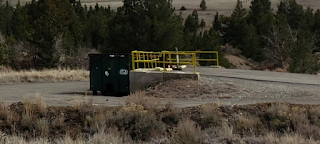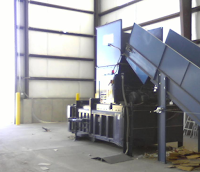Friends,
 |
| March 27 Memo 1 of 2 Pages |
 |
| March 27 Memo - Other Page |
This memo and the presentations thus far seek simple input: Whether to discontinue a costly uncertain program that is bad for the environment as is, option 1; or discontinue the bad, the carbon-intensive program but encourage curbside program for those who want to recycle, option 2. Before you get too discouraged, you should know that the program is not bad for the environment and it is more than paid for by the solid waste assessments we pay in this community.
The memo illustrates the well-advertised views of some executive staff at the city, generally those in charge of our local solid waste regime. It does not accurately reflect the situation with plastics recycling in Helena nor acknowledge the promise of what we pay for in Helena, which is supposed to include recycling and other beneficial diversion options as a priority. (A yet to be written, "Option 3" encouraged at the March 27 meeting would be to still eliminate the program but encourage education and policy against using plastics--nothing wrong with that but the decision here is about the role of public infrastructure we pay for already)
Regarding the memo and this "dollar and cents" decision as defined by the cities public works director:
- Plastics recycling saves a substantial amount of energy and water relative to virgin plastics in manufacturing; local recyclers are not landfilling this material. This recent study outlined at PlasticNews.com shows the benefit:
 Screenshots from this link April 23, 2019 Screenshots from this link April 23, 2019 |
- While the memo hints at the complexity of recycling, Helena's limited program for type 1 and 2 plastics goes to Helena Recycling. As owner John Hilton noted at both meetings, the cost increase to bale plastics reflects his need to cover costs as domestic mills are paying little to nothing for plastic supply due to high supply following changes in policies in China (addressing contamination from programs that do not have the quality control we have in Helena's programs).
- These articles from the Independent Record shows one example from when the community elected for the public landfill, transfer station and collection service option with a promise of recycling. More examples posted here.
- The solid waste assessments in our community are more than $3,000,000!
- $1,761,000 + $1,232,000 + $110,000 = $2,993,000
- City Assessment: 176.10 x 10,000 = 1,761,000
- Scratch Gravel Solid Waste District: 14,000 x $88 = 1,232,000
- *City Landfill District: ~$110,000 per year in 2013
*City residents and commercial properties also pay into a landfill district. This assessment was around $110,000 but has increased substantially after storm water flooded the old landfill for a couple of years. This district was previously paid for as part of the per ton rate at the scale. - The increased cost for plastics recycling is $6,000; just 16.5 cents per residence for the upcoming budget.
- The budgets of these operations are over-capitalized.
- Much of the recent $1,000,000 renovations currently and over the last few years at the transfer station were not recommended by the "2014 Efficiency Study." They do not prioritize diversion or other service but rather the opposite with a focus on the tonnage of trash. There are needs the city and country taxpayer-financed operation should be investing in like household hazardous waste to prevent dumping or abandoning of items not collected in town--e.g.the hex chromium that shutdown treatment at our wastewater plant.
- Even through funded primarily by assessments, these operations are managed and discussed as if an enterprise as shown in the most recent meeting minutes of the Scratch Gravel Solid Waste District. (site; minutes)
- This is part of a disturbing trend to limit services to residents while focusing on trash tonnage through the transfer station and the landfill as advanced by executive staff at the city and county. Just focusing on recommendations since the "2014 Efficiency Study," these include:
- Minimum tipping fees, originally brought to the city commission to include NO free visits to the transfer station for taxpaying residents and at a level that would allow less than one visit a month for county residents before they'd be cash customers.
- Elimination of the compost program for yard waste. Compost was presented as being a substantial cost but had substantial savings for tax-payer though it was a "loss" to the landfill.
- Proposed weekend closure of the transfer station.
- Note: I am only listing more recent items following the 2014 Efficiency Study which was controlled by those it was supposed to review. Getting rid of alleyway collection and other considerations risk increasing cost while reducing service.
- Also missing: An option to improve the current plastics program
- There are other collection models for plastic in Montana, such as this program in Kalispell using collection trucks or at the Lake County Transfer Station where separated type 1 and 2 plastics are baled and sold to a local recycling company.
- Larger hopper, maybe using the recycling area like a Z-wall to allow more storage might help with staff time and service for example.

- Other exciting options for include taking the hard to recycle plastics and breaking it down into diesel fuel and natural gas being explored by Boise as told in this story.
 |
| Baler at Lake Co., MT Transfer Station |

- Options like this will only be possible if our community is investing in recycling and like efforts with our public institutions. The current focus with priority to get more tonnage to the landfill excludes such opportunities and makes alternatives less economically viable.
Our local solid waste regime should be looking to expand services that serve our community not limit them with a clear goal of more trash to the landfill. This should include programs for household hazardous waste to protect our water (the terrible example of chromium), allow and encourage beneficial diversion of other items (like concrete and brick for soft fill or the less intensive construction and demolition landfill), and additional recycling options at and outside the transfer station such as additional drop-off sites for the Helena Valley. Many, probably most, residents do not use all of the tons of trash they have. That revenue to be accounted for in a way that allows these other services.
There are other beneficial policies and actions to consider about plastic pollution locally and globally--another theme used in the pitch for option 2 to cancel the program. The public works director cited a bottle deposit as his solution; plastic bags bans and education have also been part of the discussion as alternatives to plastics recycling at the transfer station. None of these other initiatives require the city to first cancel plastic recycling at the transfer station. All of them would only be helped by a genuine focus on beneficial diversion of waste at our public transfer station and in the related operations. None of them start with a pennywise ton foolish elimination of service and access for recycling this community pays for and deserves in our public infrastructure and services.
While this issue is not formally up for public comment yet, public comment has been sought by the above memo to two city advisory groups already and will go to the city commission at some point. County residents are impacted too, especially those who self-haul and would like to recycle. One way to join the discussion is on Facebook with "End Plastics Pollution Helena." You should also let your elected officials, including our Helena Citizen Council representatives, know you support the tax dollars you already pay for these services increasing not decreasing. Our community has a great opportunity to have more recycling but only if our public infrastructure is part of the effort.
- Matt E
Helena Resident. Former City Commissioner. Recycling since freshman year at Carroll College. Owner of 406 Recycling.
p.s. I will add more resources to this page as time allows.





